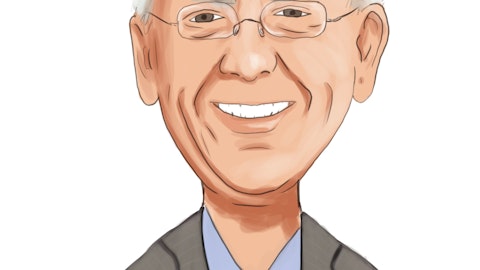In this article, we discuss the 10 stocks that billionaire David Tepper is dumping. If you want to see more stocks that the billionaire discarded, check out Billionaire David Tepper is Dumping These 5 Stocks.
David Tepper of Appaloosa Management told CNBC’s Halftime Report in October 2021 that the stock market condition depends on the interest rates, and said “I don’t love stocks. I don’t love bonds. I don’t love junk bonds”. David Tepper’s comments have been known to shake up markets, and while he admitted that his hedge fund was “probably too conservative” last year, it has managed well because of bullish positions in commodities and oil. In May this year, David Tepper said that Central Banks have a credibility problem, and in his opinion, the Fed enforcing sudden rake hikes caused the stock market to become a bit unhinged. Similarly, he critiqued the Bank of England’s interest rate movements as well.
The billionaire’s Q1 2022 portfolio declined in value to $2.5 billion from $3.8 billion in Q4 2021. The top ten holdings of his fund make up 70.5% of the total portfolio, with investments primarily in the consumer discretionary, information technology, communications, utilities and telecommunications, and energy sectors. In the first quarter of 2022, David Tepper’s hedge fund rearranged its portfolio and slashed its positions in 26 holdings, while discarding 12 securities entirely.
Some of the most notable stocks that billionaire David Tepper dumped in Q1 2022 include General Motors Company (NYSE:GM), T-Mobile US, Inc. (NASDAQ:TMUS), and D.R. Horton, Inc. (NYSE:DHI).
Our Methodology
We selected 10 prominent stocks that billionaire David Tepper either sold off entirely in Q1 2022 or dumped a major portion of his holding during the quarter. We have ranked the list according to the hedge fund sentiment around the stocks, which was assessed from Insider Monkey’s Q1 database of 900+ elite hedge funds.

Billionaire David Tepper is Dumping These Stocks
10. Foot Locker, Inc. (NYSE:FL)
Number of Hedge Fund Holders: 21
Foot Locker, Inc. (NYSE:FL) is a New York-based athletic footwear and apparel retailer. David Tepper added Foot Locker, Inc. (NYSE:FL) to his portfolio in Q4 2021 by purchasing 165,938 shares worth $7.24 million. The billionaire disposed of his stake in the first quarter of 2022.
UBS analyst Jay Sole on July 15 lowered the price target on Foot Locker, Inc. (NYSE:FL) to $28 from $35 and maintained a Neutral rating on the shares as part of a broader note on Softlines Retail. The analyst observed that there is a high risk that inflation will hamper industry sales growth and dampen market sentiment. While softline stocks have underperformed the S&P 500 with a 38% year-to-date average drop, higher pressure in the future is likely as investors show little interest in purchasing securities amid a low sales environment, the analyst told investors.
According to Insider Monkey’s data, 21 hedge funds were bullish on Foot Locker, Inc. (NYSE:FL) at the end of the first quarter of 2022, down from 27 funds in the preceding quarter. The collective stakes declined in Q1 2022 to $177 million from $222.4 million in the last quarter. Jim Simons’ Renaissance Technologies is the biggest stakeholder of the company, with 913,900 shares worth $27.10 million.
In addition to General Motors Company (NYSE:GM), T-Mobile US, Inc. (NASDAQ:TMUS), and D.R. Horton, Inc. (NYSE:DHI), David Tepper was bearish on Foot Locker, Inc. (NYSE:FL) in Q1 2022.
Here is what Miller Value Partners Deep Value Strategy has to say about Foot Locker, Inc. (NYSE:FL) in its Q1 2022 investor letter:
“Finally, Foot Locker (NYSE:FL) came under significant pressure during the quarter, with the stock down more than 50% from its highs and valuation not far from early 2020 lows. Nike continues to place a greater focus on their Direct-to-Consumer business, which will decrease their contribution to Foot Locker’s total sales, retreating to historical averages of 50% by 2023. While a near-term headwind to sales, management plans to offset the lost business by expanding distribution to other leading brands, rolling out larger neighborhood free-standing stores, and expanding two new growth banners (WSS & Atmos). WSS stores will provide an off-mall presence and focus on the rapidly growing and underserved Hispanic market. Atmos will provide Foot Locker with the ability to expand into the Japan and Asia sneaker market with their digitally led business model. These new growth concepts have a combined potential to add more than $1B in sales by 2024. The company’s balance sheet remains very strong with $800M in cash and management is increasing returns to shareholders through raising the dividend by 40% and announcing a $1.2B share buyback (more than 40% of the float at current share prices). With the next 12 to 18 months as a transition period for the company, the share price weakness provides attractive reward/risk investment potential, near 3x Enterprise Value/Earnings Before Income, Taxes, Depreciation, and Amortization (EV/EBITDA) and close to a 30% normalized free cash flow yield.”
9. The Gap, Inc. (NYSE:GPS)
Number of Hedge Fund Holders: 23
The Gap, Inc. (NYSE:GPS) was incorporated in 1969 and is headquartered in San Francisco, California. It operates as an apparel retail company. Billionaire David Tepper’s Appaloosa Management acquired 494,032 shares of The Gap, Inc. (NYSE:GPS) in Q4 2021, worth $8.72 million, representing 0.22% of the total 13F portfolio. The hedge fund sold off his stake entirely in the first quarter of 2022.
On July 15, UBS analyst Jay Sole lowered the price target on The Gap, Inc. (NYSE:GPS) to $8 from $11 and kept a Neutral rating on the shares as part of a broader research thesis on Softlines Retail. While softline stocks have underperformed the S&P 500 with a 38% year-to-date average decline, the analyst sees higher pressure ahead as investors indicate slight interest in acquiring stocks amid a decelerating sales backdrop.
According to Insider Monkey’s data, 23 hedge funds were bullish on The Gap, Inc. (NYSE:GPS) at the end of Q1 2022, down from 30 funds in the last quarter. Ken Griffin’s Citadel Investment Group is the biggest position holder in the company, with 5.2 million shares worth about $74 million.
8. CarMax, Inc. (NYSE:KMX)
Number of Hedge Fund Holders: 27
CarMax, Inc. (NYSE:KMX) was founded in 1993 and is based in Richmond, Virginia. It is a retailer of used vehicles in the United States, operating through two segments – CarMax Sales Operations and CarMax Auto Finance. David Tepper’s Appaloosa Management added CarMax, Inc. (NYSE:KMX) to its portfolio in Q4 2020, and in the fourth quarter of 2021, the hedge fund owned 391,500 shares worth about $51 million. In Q1 2022, David Tepper dumped his CarMax, Inc. (NYSE:KMX) stake entirely.
On July 14, Morgan Stanley analyst Adam Jonas lowered the price target on CarMax, Inc. (NYSE:KMX) to $124 from $140 and assigned an Overweight rating to the stock. He made “material cuts” to estimates in his autos and shared mobility coverage, especially in FY23, to factor in hampered growth and credit headwinds. The analyst added that his slashed top line and EBITDA estimates leave his forecasts 5% to 10% below market consensus. The primary drivers of the changes include the U.S. SAAR cut that took his FY23 SAAR forecast to 15 million units, anticipations for price/mix declining from peak comps, and auto credit challenges, the analyst told investors.
According to Insider Monkey’s Q1 data, CarMax, Inc. (NYSE:KMX) was part of 27 hedge fund portfolios, down from 35 funds in the prior quarter. Charles Akre’s Akre Capital Management is the leading shareholder of the company, with 7.3 million shares worth over $708 million.
Here is what Giverny Capital Asset Management has to say about CarMax, Inc. (NYSE:KMX) in its Q1 2022 investor letter:
“As for our other big decliners, Carmax is the country’s largest seller of used autos. Last year, amid supply chain shortages, production of new cars slowed. This created huge demand for used cars, and prices surged. Carmax opted to hold its gross profit dollars per vehicle flat in this environment, which benefits customers. If historically Carmax sold a used car for an average price of $21,000 with a $2,100 gross profit, in 2022 it sold used cars for an average price of $29,000 with a $2,200 gross profit. This decision was not well-received by Wall Street. In fairness to the critics, Carmax faced inflationary costs in wages and other areas that may have justified charging higher mark-ups. Still, Carmax sold 23% more vehicles in 2021 than in 2020, earned a lot more money and grew its market share to 4% of all transactions for used cars under 10 years old, from 3.5% a year ago. Presumably, the decision to price responsibly won it some customer goodwill that will result in future business.
Recently, those very high prices for used cars have caused demand to wane. Carmax may sell fewer cars in 2022 than in 2021, which unnerves investors. But it continued to gain market share in early 2022 and still generate healthy profits. Carmax has become quite inexpensive relative to its proven ability to grow profitably in an enormous industry. A 4% market share leaves a lot of room for growth. We added modestly to our position during the first quarter.”
7. PulteGroup, Inc. (NYSE:PHM)
Number of Hedge Fund Holders: 27
PulteGroup, Inc. (NYSE:PHM) is a Georgia-based homebuilding company. The company builds single-family, townhomes, condominiums, and duplexes under the Centex, Pulte Homes, Del Webb, DiVosta Homes, American West, John Wieland Homes, and Neighborhoods brand names. David Tepper’s hedge fund owned 1.45 million PulteGroup, Inc. (NYSE:PHM) shares in Q4 2021 worth $82.8 million, which it dumped in the first quarter of 2022.
On July 27, BofA analyst Rafe Jadrosich downgraded PulteGroup, Inc. (NYSE:PHM) to Neutral from Buy but raised the price target to $48 from $41. After Q2 earnings, he sees less upside to shares on the back of softer home demand, the relative underperformance of built-to-order homes as buyers prefer quick move-in homes, and a less attractive valuation following the 18% recovery in shares since mid-June.
Harris Associates held the largest stake in PulteGroup, Inc. (NYSE:PHM) as of Q1 2022, with 4.3 million shares worth about $184 million. Overall, 27 hedge funds were bullish on PulteGroup, Inc. (NYSE:PHM) at the end of March 2022, down from 35 funds in the last quarter.
Here is what Oakmark Fund has to say about PulteGroup, Inc. (NYSE:PHM) in its Q1 2022 investor letter:
“Pulte (NYSE:PHM) is one of the nation’s largest homebuilders. While demographic tailwinds are expected to support healthy housing demand for years to come, more important to our thesis is the company’s operational transformation over the past decade. Having adopted a more rigorous, returns-driven approach to land acquisition and manufacturing, Pulte now consistently earns returns on equity near the high end of its peer group. We expect the company to generate approximately 15% of its market cap in free cash flow this year, and management is putting that cash to good use by strengthening its balance sheet and returning capital to shareholders. While we recognize that the recent surge in home prices is producing a level of profitability that’s above what we would consider “normal,” we still find the stock attractive relative to our more tempered estimate of mid-cycle earnings.”
6. DICK’S Sporting Goods, Inc. (NYSE:DKS)
Number of Hedge Fund Holders: 31
DICK’S Sporting Goods, Inc. (NYSE:DKS) is a Pennsylvania-based sporting goods retailer that owns and operates Sporting Goods, Golf Galaxy, Field & Stream, Public Lands, Going Going Gone!, and other specialty retail stores. David Tepper purchased 178,072 shares of DICK’S Sporting Goods, Inc. (NYSE:DKS) in Q4 2021, worth $20.5 million. The billionaire dumped his position completely in the first quarter of 2022.
On July 20, Stifel analyst Jim Duffy raised the price target on DICK’S Sporting Goods, Inc. (NYSE:DKS) to $84 from $75 and kept a Hold rating on the shares. He slashed estimates for almost all Americas Sports and Lifestyle Brands companies in his coverage given surplus inventories, moderate traffic, and early promotions.
Among the hedge funds tracked by Insider Monkey, 31 funds reported owning stakes in DICK’S Sporting Goods, Inc. (NYSE:DKS) at the end of March 2022, down from 37 funds in the prior quarter. Stephen Mandel’s Lone Pine Capital is the leading position holder in the company, with 3.7 million shares worth $373.24 million.
Like General Motors Company (NYSE:GM), T-Mobile US, Inc. (NASDAQ:TMUS), and D.R. Horton, Inc. (NYSE:DHI), David Tepper exited his position in DICK’S Sporting Goods, Inc. (NYSE:DKS) in the first quarter of 2022.
Here is what Baron Fund has to say about DICK’S Sporting Goods, Inc. (NYSE:DKS) in its Q1 2022 investor letter:
“Dick’s Sporting Goods, Inc. was the first stock Michael recommended to us shortly after he joined Baron Capital in 2003. Dick’s share price has since increased about nine-fold. Unfortunately, we sold our investment in Dick’s about six years ago and, although it was a successful investment, we did not realize the full benefit of Michael’s recommendation. We sold too soon because I was concerned that competition from internet retailers would have a permanent negative impact on Dick’s stores’ profitability. I was wrong. Dick’s stock price so far has about doubled after we sold…and its prospects have brightened!
We sold even though we considered Ed Stack, Dick’s Chairm”n and CEO, a terrific retailer, a great entrepreneur and a special person. Ed had built Dick’s from three bait and tackle stores his dad started into a uniquely positioned, nationwide chain of 730 sporting goods stores. In fact, Dick’s is now the largest nationwide sporting goods chain. Ed had purchased the three bait and tackle stores, the foundation of Dick’s business, from his dad. Ed’s mother loaned him the money to buy his dad’s stores! I’m not exactly sure what that signifies. But it may have something to do with Carl Icahn’s proclamation that “everything I have is for sale except my children…and maybe my wife.”
Ed and his newly appointed CEO Lauren Hobart visited us last month. Ed asked for the meeting to introduce us to Lauren, as well as to discuss the prospects for Dick’s new, large format stores with attached outdoor, student athletic fields. Lauren then described how well its new format stores were doing in two smaller communities. We also spoke about the successes of Dick’s omni-channel retailing efforts and how desirable Dick‘s stores have become to shopping centers trying to lure shoppers to return to their malls.”
Click to continue reading and see Billionaire David Tepper is Dumping These 5 Stocks.
Suggested articles:
- 10 Stocks To Buy According to William Von Mueffling’s Cantillon Capital Management
- 10 Healthcare Stocks to Buy Now According to Billionaire Larry Robbins
- Cathie Wood’s 10 Favorite Stock Picks For The Rest of 2022
Disclosure: None. Billionaire David Tepper is Dumping These 10 Stocks is originally published on Insider Monkey.





